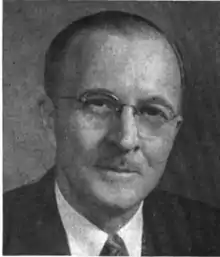William Moore McCulloch
William Moore McCulloch (November 24, 1901 – February 22, 1980) was an American politician and a member of the Republican Party who served as a U.S. Representative for Ohio's 4th congressional district from 1947 to 1973.
William Moore McCulloch | |
|---|---|
 | |
| Member of the U.S. House of Representatives from Ohio's 4th district | |
| In office November 4, 1947 – January 3, 1973 | |
| Preceded by | Robert Franklin Jones |
| Succeeded by | Tennyson Guyer |
| Member of the Ohio House of Representatives | |
| In office 1933–1944 | |
| Personal details | |
| Born | November 24, 1901 Holmesville, Ohio, U.S. |
| Died | February 22, 1980 (aged 78) Washington, D.C., U.S. |
| Resting place | Arlington National Cemetery |
| Political party | Republican |
| Spouse(s) | Mabel Harris (m. 1927) |
| Children | Nancy McCulloch Ann McCulloch |
| Alma mater | College of Wooster Ohio State University |
McCulloch was born near Holmesville, Ohio. He attended the College of Wooster in Wooster, Ohio. He graduated from the college of law of Ohio State University at Columbus, Ohio, in 1925. He was admitted to the bar the same year and commenced practice in Piqua, Ohio. He was a member of the Ohio House of Representatives from 1933 to 1944, serving as minority leader from 1936 to 1939 and as speaker from 1939 to 1944. He served in the United States Army from December 26, 1943, to October 12, 1945.
McCulloch was elected as a Republican to the Eightieth Congress, by special election, on November 4, 1947, to fill the vacancy caused by the resignation of Robert Franklin Jones. He was re-elected to twelve consecutive Congresses.
Fight for civil rights
As the ranking member of the House of Representatives Judiciary Committee, William McCulloch took a leading role in the civil rights movement. He introduced civil rights legislation months before Kennedy presented his act to Congress. Representative McCulloch had only a few of African-American constituents and so few votes to gain from introducing or supporting civil rights legislation. McCulloch's influence with the Civil Rights Act led President John F. Kennedy to declare, "Without him it can't be done." McCulloch was recognized by Kennedy's successor, Lyndon B. Johnson, under whom the act was passed, as "the most important and powerful political force" in passing the Act.
Todd Purdum, in his history of the civil rights era An Idea Whose Time Has Come, said in an interview:
[McCullough] had been distressed when then Senate Majority Leader Johnson watered down civil rights bills in 1957 and 1960 to make them practically unenforceable. McCulloch was the ranking minority member of the House judiciary committee, and he told the Kennedy Administration that he would back a strong bill in the House – and urge his fellow Republicans to follow suit – but only if the White House agreed not to trade away the bill's strongest provisions in the Senate, and also agreed to give Republicans equal credit for passing it.[1]
McCulloch voted in favor of the Civil Rights Acts of 1957,[2] 1960,[3] 1964,[4] and 1968,[5] and the Voting Rights Act of 1965.[6]
Other issues
Throughout his career, McCulloch was a conservative (demonstrated by low Americans for Democratic Action (ADA) scores) and a strong supporter of civil rights. As ranking Republican on the House Judiciary Committee, he, with Democratic Chairman Emanuel Celler, pushed the Civil Rights Act of 1964 through the House of Representatives. During the Great Society Congress, he opposed most Great Society legislation. After the Great Society Congress (1965–1966), he began to adopt a few liberal positions, such as supporting strong gun control legislation in 1968 as well as busing. He was not a candidate for reelection in the 1972 election to the Ninety-third Congress. He then resumed the practice of law in Piqua, Ohio.
In early 2010, McCulloch was proposed by the Ohio Historical Society as a finalist in a statewide vote for inclusion in Statuary Hall at the United States Capitol.
Personal life
On October 17, 1927, McCulloch eloped with Mabel Harris in Covington, Kentucky.[7] They had two daughters, Nancy and Ann.[8]
McCulloch died on February 22, 1980, in Washington, D.C. due to a heart attack.[9] He is buried in Arlington National Cemetery with his wife.[9] In the film All the Way, Congressman McCulloh is portrayed by Dan Desmond.[10]
Notes
- Purdum, Todd S., and Cullen Murphy, "The Battle to Pass the Civil Rights Act of 1964", Vanity Fair, March 31, 2014. Retrieved 2014-06-19.
- "HR 6127. CIVIL RIGHTS ACT OF 1957". GovTrack.us.
- "HR 8601. PASSAGE".
- "H.R. 7152. PASSAGE".
- "TO PASS H.R. 2516, A BILL TO ESTABLISH PENALTIES FOR INTERFERENCE WITH CIVIL RIGHTS. INTERFERENCE WITH A PERSON ENGAGED IN ONE OF THE 8 ACTIVITIES PROTECTED UNDER THIS BILL MUST BE RACIALLY MOTIVATED TO INCUR THE BILL'S PENALTIES".
- "TO PASS H.R. 6400, THE 1965 VOTING RIGHTS ACT".
- Bernstein, p. 21.
- Bernstein, p. 56.
- Bernstein, p. 243.
- "All the Way (TV)". Paley Center for Media. Retrieved July 10, 2020.
References
- Bernstein, Mark (2014). McCulloch of Ohio: For the Republic. Crown Equipment Corporation. ISBN 978-0692204368.
External links
| Wikimedia Commons has media related to William Moore McCulloch. |
- United States Congress. "William Moore McCulloch (id: M000393)". Biographical Directory of the United States Congress.
- The Political Graveyard
- William Moore McCulloch at Find a Grave
| U.S. House of Representatives | ||
|---|---|---|
| Preceded by Robert Franklin Jones |
Member of the U.S. House of Representatives from Ohio's 4th congressional district 1947–1973 |
Succeeded by Tennyson Guyer |
